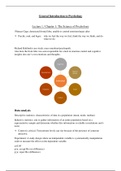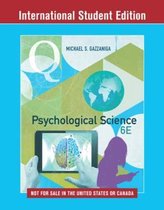General Introduction to Psychology
Lecture 1 / Chapter 1: The Science of Psychology
Phineas Gage: destructed frontal lobe, unable to control emotions/urges after
Psychè, soul, and logos: why we feel the way we feel, think the way we think, and do
what we do
Richard Kuklinski case study: mass murderer/psychopath.
Also here the front lobe was seen responsible for a lack in emotion control and cognitive
insights into one’s own emotions and thoughts.
Cognitive
Neutral
Development
(Brain)
Individual
Evolution Social
Culture
Data analysis
Descriptive statistics: characteristics of data in a population (mean, mode, median)
Inductive statistics: aim to gather information of an entire population based on a
representative sample and determine whether this information is reliable (correlations and t-
tests)
Context is critical. Testosterone levels can rise because of the presence of someone
attractive.
Experiment: A study design where an independent variable is systematically manipulation
order to measure the effect on the dependent variable.
a=0.05
p>a: accept Ho (no difference)
p≤a: reject Ho (difference)
, Addition Chapter 1 – The Science of Psychology
Psychological Science is the study, through research, of mind, brain, and behaviour
Mind = Mental activity that results from biological processes within the brain.
Behaviour = Totality of observable human/animal actions.
Psychological reasoning = using psychological research to examine how people typically
think
Biases
1. Confirmation bias
Looking for flaws in studies that are not consistent with our beliefs or only visiting
websites that share our point of view. (disconfirmation bias: wanting more proof
before accepting an argument that goes against their view)
2. Hindsight bias
Coming up with explanations afterwards.
3. Heuristics
Simple rules that are followed to make decisions without too much effort.
Heuristics can lead to inaccurate judgement and biased outcomes. Just because one
plane crashed, it doesn’t mean that mine will or that I should ignore the danger of cars.
4. Self-serving bias
More than 90% of people think they are above-average drivers, while only 50% can be
better-than-average. Crediting personal strength for success and blaming outside
forces for failure.
The mind/body problem
Are mind and body separate and distinct, or is the mind the physical brain’s subjective
experience?
It was long believed that the mind was separate from and in control of the body -> theological
belief that the soul separates humans from nonhuman animals
Da Vinci believed that all sensory messages arrive in one location in the brain, the sensus
communis (=> common sense)
René Descartes: dualism – mind and body are separate but intertwined. The body is a machine
governed by “reflex”. Mental functions such as memory and imagination result from body
functions. Deliberate action, however, was controlled by the rational mind.
Nowadays, psychologists reject dualism. The mind arises from brain activity.
,Willhelm Wundt:
Formal beginning of the discipline of psychology in Germany, 1879
Realised that psychological processes, the products of psychological actions in the brain, take
time to occur. Reaction time measures how long a mental event takes to occur.
Reaction time = time to complete complex task - time to complete simple task
But this cannot measure conscious experiences.
Introspection // systematic examination of subjective mental experiences that requires
people to inspect and report on the content of their thoughts.
Edward Titchener:
Noticed that the problem is that experience is subjective.
This led to a school of thought called structuralism
➢ Conscious experience can be broken down into its basic underlying components, much
as the periodic table breaks down into chemical elements. This understanding could
provide the scientific basis for understanding the mind.
William James:
Was a critic of structuralism and said that the mind is much more complex than its elements
and cannot be broken down.
The stream of consciousness cannot be frozen in time.
(continuous series of ever-changing thoughts)
Solution: functionalism -> concerned with the adaptive purpose of mind and behaviour
, Max Wertheimer:
Founded the Gestalt school in opposition to structuralism
-> the whole of personal experience is different from the sum of its parts. The perception of
objects is subjective and dependent on context. Perception is the interpretation of a sensation.
> bottom-up: perception based on the physical features of the stimulus
> top-down: knowledge, expectations, or past experiences shape the interpretation of sensory
information
B.F. Skinner & John Watson:
Problem: study of the mind is too subjective and therefore unscientific. They focus on
observable behaviour.
Behaviourism – emphasises the role of environmental forces in behaviour





